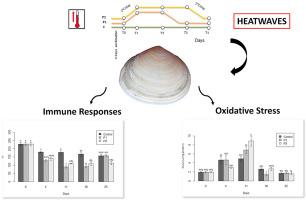Fish & Shellfish Immunology ( IF 4.1 ) Pub Date : 2020-09-18 , DOI: 10.1016/j.fsi.2020.09.024 V E Amorim 1 , O Gonçalves 1 , R Capela 1 , S Fernández-Boo 2 , M Oliveira 1 , M Dolbeth 3 , F Arenas 3 , P G Cardoso 1

|
As a consequence of global warming, extreme events, such as marine heatwaves (MHW), have been increasing in frequency and intensity with negative effects on aquatic organisms. This innovative study evaluated for the first time, the immunological and physiological response of the estuarine edible bivalve Scrobicularia plana to different heatwaves, with distinct duration and recovery periods. So, extensive immune (total haemocyte count - THC, haemocyte viability, phagocytosis rate, respiratory oxidative burst of haemocytes, total protein, protease activity, nitric oxide and bactericidal activity of plasma) and oxidative stress (lipid peroxidation - LPO, superoxide dismutase - SOD, catalase - CAT and glutathione-S-Transferase - GST) analyses were performed in an experimental study that tested the impact of heatwaves during 25 days. The survival and condition of S. plana were not affected by the exposure to the extreme events. However, our data suggested that longer heatwaves with shorter recovery periods can be more challenging for the species, since THC and phagocytic activity were most affected under the temperature increase conditions. Regarding the oxidative status, the species increased its SOD activity while MDA production slightly declined to the increase of temperature, protecting the organism from cellular damage. These results indicate that S. plana has a great capacity to adapt to environmental temperature changes, however, the expected higher frequency/duration of heatwaves with climate change trends can cause some debility of the species face to other stressors, which can compromise its success in the future.
中文翻译:

双壳类轮盘菌对热波的不同模式的免疫和氧化应激反应。
全球变暖的结果是,诸如海洋热浪(MHW)等极端事件的频率和强度不断增加,对水生生物产生了负面影响。这项创新研究首次评估了河口可食用双壳类Scrobicularia的免疫和生理反应到不同的热浪,具有不同的持续时间和恢复时间。因此,具有广泛的免疫力(总血细胞计数-THC,血细胞活力,吞噬率,血细胞的呼吸氧化爆发,总蛋白,蛋白酶活性,一氧化氮和血浆的杀菌活性)和氧化应激(脂质过氧化-LPO,超氧化物歧化酶-SOD ,过氧化氢酶-CAT和谷胱甘肽-S-转移酶-GST)分析是在一项实验研究中进行的,该研究测试了25天热浪的影响。平板链球菌的生存和状况不受极端事件影响的影响。但是,我们的数据表明,更长的热波和更短的恢复时间对于该物种而言可能更具挑战性,因为THC和吞噬活性在温度升高条件下受影响最大。关于氧化状态,该物种增加了其SOD活性,而MDA的生成随温度的升高而略有下降,从而保护了生物免受细胞损害。这些结果表明,扁平链球菌具有适应环境温度变化的强大能力,但是,随着气候变化趋势,预期的热波频率/持续时间的升高可能会导致该物种面对其他胁迫因素的衰弱,从而损害其成功繁殖的能力。未来。









































 京公网安备 11010802027423号
京公网安备 11010802027423号